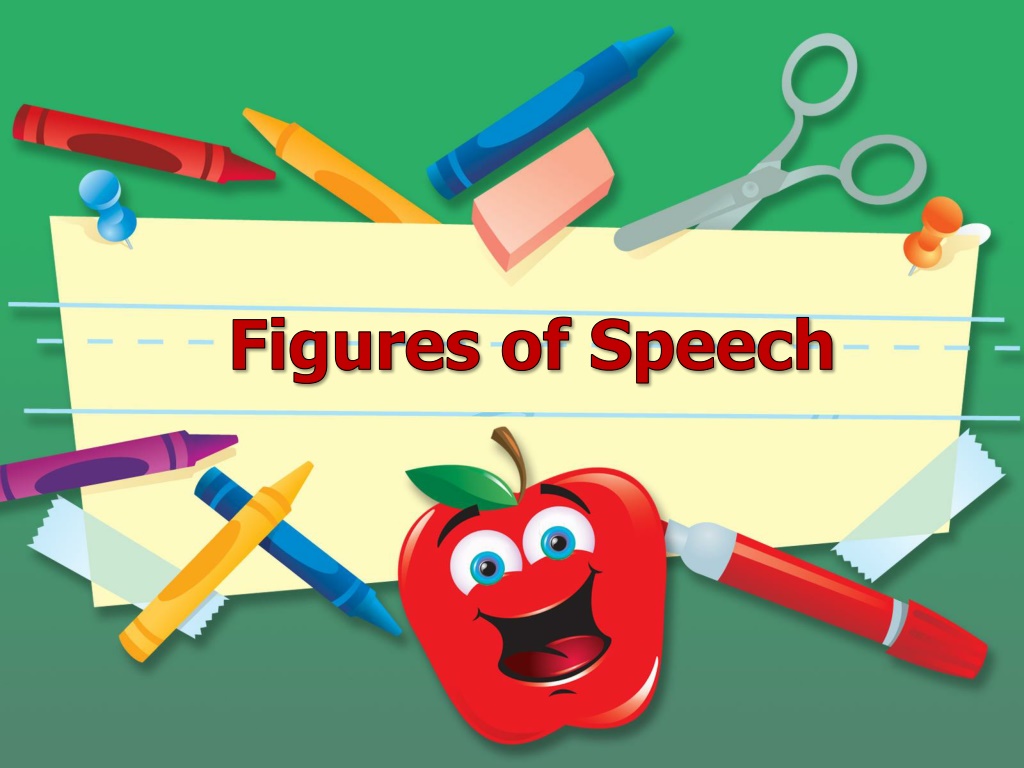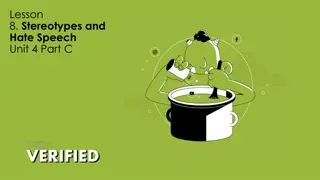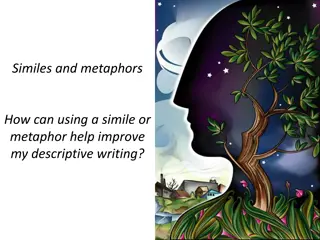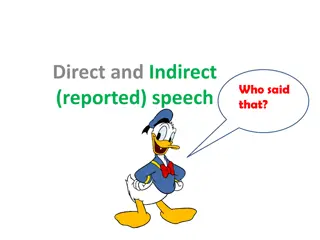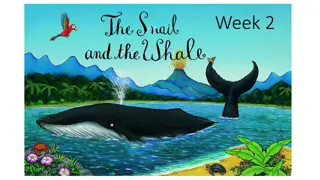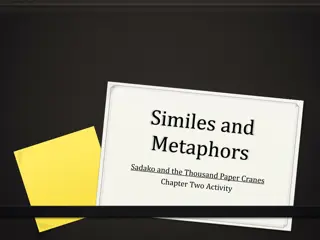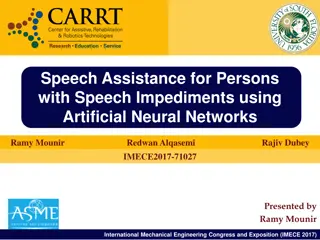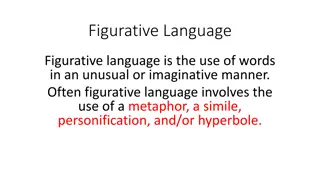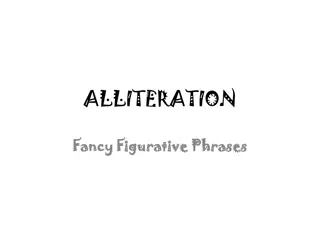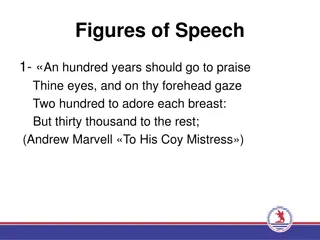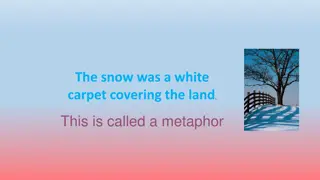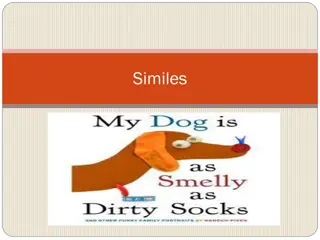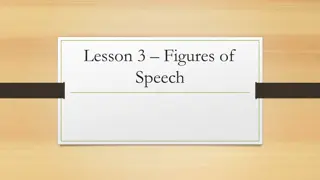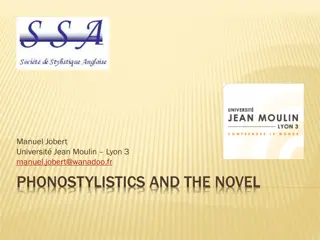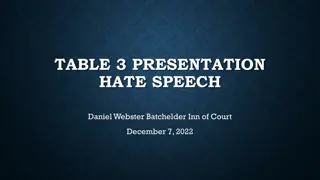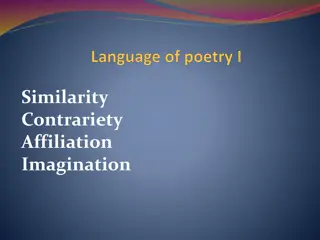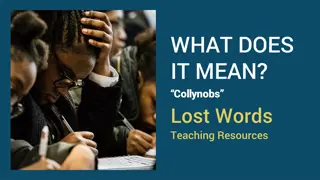Exploring Similes: Figures of Speech with Creative Examples
Delve into the world of similes, where one thing is compared to another using "like" or "as". Uncover the power of similes through engaging examples such as "as brave as a lion" and "like tangled spaghetti". Discover how similes evoke vivid imagery and enhance writing. Engage in tasks to analyze, choose, and create your own similes.
Download Presentation

Please find below an Image/Link to download the presentation.
The content on the website is provided AS IS for your information and personal use only. It may not be sold, licensed, or shared on other websites without obtaining consent from the author. Download presentation by click this link. If you encounter any issues during the download, it is possible that the publisher has removed the file from their server.
E N D
Presentation Transcript
A simile is when you compare one thing to another using like or as. For example: as daft as a brush as mad as a hatter as cool as ice this room is like a pigsty.
Task 1: Explain each simile in your own words 1.The athlete ran like a greyhound. 2.The teacher laughed like a hyena. 3.The fire-fighter was as brave as a lion. 4.The roads were like tangled spaghetti. 5.The woman had eyes like sapphires. 6.The man was as quiet as a mouse. 7.The helicopter was like a tiny insect. 8.The boy ran like the wind. The wind can be very fast, so the boy must have been too Greyhounds are known for their speed so the athlete must have been very fast Hyenas make a distinct noise which sounds like a manic laugh so the teacher must have sounded like that Lions are fearless and so must the fire-fighter have been too Spaghetti strands can become interwoven, just like the junctions of a busy road Sapphires are an intense shade of blue, just as the woman s eyes must have been Mice can creep about so quietly they go unnoticed so too must have the man The helicopter was so far away, it looked really small
Task 2: Choose which simile you think is most effective. Explain why you have chosen this simile. Choose any from the previous 8 examples Explain what the simile conjures up in a reader s mind and why it is such a good comparison Let the teacher have a look!
Task 3: Now complete the following similes with an idea of your own. Answers don t have to be the same as these but they should give you an idea of what we re looking for: The man was as cheeky as a chimp The boy was as scared as a mouse The river was as twisty as a corkscrew The runner was as slow as treacle The school was as old as the hills The puzzle was as complicated as the English language
When you are looking at similes consider what two things are being compared and what they have in common. It could be colour, size, shape, movement, or the quality they have in common. You must remember to make your similes realistic. My dad is as tall as a skyscraper might not be quite true!
Task 4: It is now your turn to think of some similes of your own. Try to think of similes that use like and as. Write six similes in your jotter. Let the teacher have a look!
Read the passage and attempt the tasks which follow: As George left the house the night air felt like icicles upon his pale face. He noticed his bus just ahead of him but realised he would have to run like the wind to catch it. Noting that this would heat him up he galloped like a horse and reached the bus just as it was pulling away from the stop. He s just like my dad! exclaimed George about the bus driver. He set off home with his face tripping him. By the time he reached his gate his hands were as cold as ice. What a dreadful evening it has been! muttered George as he slammed the gate shut behind him.
Task 1: Write down four similes from the passage. Task 2: Write down four sentences of your own, each containing a simile. Task 1: The night air felt like icicles upon his pale face He would have to run like the wind to catch it He galloped like a horse His hands were as cold as ice Task 2: Let the teacher have a look!
Read the passage and attempt the tasks which follow: Ann had not really wanted to see this particular film but once Mike got an idea in his mind he was like a dog with a bone. Mike had promised that real blood was not used in horror films, only a red liquid which looked like tomato sauce. She eventually relented and agreed to go but all through the film she clung to Mike s arm as if her life depended on it. Well, did you enjoy that? asked Mike who was grinning like a cat. What do you think? retorted Ann, still shaking like a leaf. I ll never let you persuade me into anything like that again!
Task 1: Write down four similes from the passage. Task 2: Write down four sentences of your own, each containing a simile. Task 1: He was like a dog with a bone She clung to Mike s arm as if her life depended on it Mike who was grinning like a cat Shaking like a leaf Task 2: Let the teacher have a look!
Read the passage and attempt the tasks which follow: What a pig! exclaimed Sally as she threw her watch on the sofa. Is there anything wrong dear? asked her mother. Sally explained that her boyfriend Paul had arranged to pick her up an hour ago and still had not arrived. My heart is broken, Mum. You drive me up the wall with your exaggerations. Just calm down and put the kettle on. You can have a nice evening in with me instead. Sally started to weep buckets at this until she heard the doorbell ring. She wiped her tears and rushed to the door smiling. That girl is an actress! said her exasperated mother. Before you begin to attempt the following tasks, you should remember that a metaphor is a comparison where one thing is said to be another thing.
Task 1: Write down four metaphors from the passage. Task 2: Write down four sentences of your own, each containing a metaphor. Task 1: What a pig! My heart is broken, Mum You drive me up the wall with your exaggerations Sally started to weep buckets Task 2: Let the teacher have a look!
Read the passage and attempt the tasks which follow: Look at that bird s nest of a haircut! exclaimed Tony s dad. But it s the fashion, honest dad! Tony replied. Tony was quite proud of his haircut and couldn t understand why even the hairdresser had been doubtful of it at first. This is a big step, lad, from your last style, the hairdresser had warned him. Tony s face had turned beetroot at this but he had insisted on proceeding. I ve got to fly, Dad. I said I d take Gran s dog for a walk. You ll be lucky. The dog will run a mile when he sees the state of your hair! laughed his dad.
Task 1: Write down four metaphors from the passage. Task 2: Write down four sentences of your own, each containing a metaphor. Task 1: Look at that bird s nest of a haircut! Tony s face had turned beetroot I ve got to fly, Dad The dog will run a mile Task 2: Let the teacher have a look!
Noise by J Pope I like noise. The whoop of a boy, the thud of a hoof, The rattle of rain on a galvanised roof. The hubbub of traffic, the roar of a train, The throb of machinery numbing the brain, The switch of wires in an overhead train, The rush of the wind, a door on the slam, The boom of the thunder, the crash of the waves, The din of a river that races and roars. The crack of a rifle, the clank of a pail, The strident tattoo of a swift-slapping sail. From any old sound that the silence destroys, Arises a gamut of soul-stirring joys. I like noise.
Task 1: Answer the questions 1.Which animal is the poet thinking of when she writes the thud of a hoof ? 2.What does numbing the brain mean? 3.What is meant by a river that races and roars ? 4.Explain the phrase a strident tattoo . The drum-like noise a sail flapping in the wind might make A horse Stopping thinking about anything else A fast and powerful river
Task 1: Answer the questions 5.What is different about the sentence beginning From any old sound ? 6.Explain in your own words a gamut of soul-stirring joys . 7.What do you notice about the first and last lines of the poem? 8.Why has the poet done this? To emphasis how much they like noise Doesn t start with The Lots of things to make you happy They are the same
Task 2: Make a list of all the onomatopoeic words and nouns which cause the noise Noise Noun Whoop boy Thud Hoof Rattle Rain Hubbub Traffic Roar Train throb Machinery Switch Wires Rush Wind Boom Thunder Din River Crack Rifle Clank Pail Tattoo Sail
Task 3: Suggest as many different noises for each of the following: Noise Noun Yelp Boy Swish Wind Drip Rain Screeching Traffic Throng Train Clank Machinery Crash Thunder Trickle River Scrape Pail Let the teacher have a look!
Task 4: Write your own I like noise poem Let the teacher have a look!
